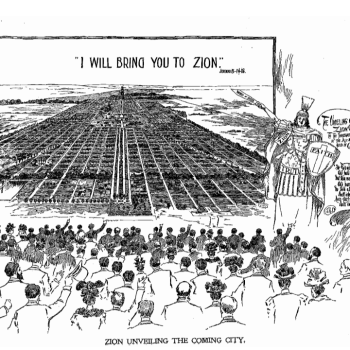John Cotton (1585-1652) is a towering figure in the history of English puritanism and early New England Congregationalism, probably most remembered for his role in the controversy that led to the 1638 banishment and excommunication of Anne Hutchinson.
Cotton’s namesake son is deservedly less well known, but his extensive correspondence (edited and published ten years ago by Sheila McIntyre and Len Travers) makes him an invaluable source of information about King Philip’s War and the political controversies that followed it. Cotton was not without his strengths. He was the most effective minister the town of Plymouth ever had (the Pilgrims left their pastors behind in Leiden and had few positive things to say about the ministers who came to the colony in its early decades). Cotton also played important roles in the evangelization of Wampanoags, both on Martha’s Vineyard in the mid-1660s and also after he came to Plymouth. He learned enough to preach to the Indians in their own language, played some role in the conversions of a number of Wampanoag individuals and families in the 1670s, and helped with the mid-1680s revision of John Eliot’s Bible.
[Let me pause and note that the volume of Cotton’s correspondence edited by McIntyre and Travers is simply first rate. The transcriptions are accurate to the original manuscripts, and the annotations are invaluable.]
Cotton’s ministerial career, however, began and ended with scandal. During a probationary post in Wethersfield, Connecticut, the recently married pastor was accused of what we would today call sexual misconduct. Several woman made accusations against Cotton, and the allegations ranged from untoward behavior to adultery. Cotton allegedly talked his way into one woman’s “chamber” by pretending an interest in her furniture. Another woman accused Cotton of “sinfull striving.” In response, Cotton compared himself to Joseph and his accuser to Potiphar’s wife. She had pursued him. A court-appointed committee of two magistrates and two ministers found insufficient evidence that Cotton had committed a “more grose acte” but criticized his “sinfull Rach [rash] unpeaceabell” expressions. In particular he had defamed the daughter of Connecticut’s governor. Perhaps they felt incapable of sorting out the truth of the other allegations, but there was no way Cotton was going to become Wethersfield’s pastor.
A disgraced Cotton slunk back to Boston. According to Michael G. Hall, Cotton confessed his sexual misdeeds to Increase Mather. Mather then conferred with Bay Colony magistrate John Leverett, a prominent member in Boston’s First Church, to which Cotton still belonged. Mather and Leverett agreed that church members would meet privately to discipline Cotton, who was excommunicated for “lacivious uncleane practises with three women and his horrid lying to hide his sinne.” Cotton now openly confessed his sins to the congregation, which soon restored him to fellowship. A promising ministerial career had shipwrecked.
Cotton probably envisioned filling the pulpit of his father’s church or of another prominent church in Massachusetts Bay. Those opportunities now closed, but he slowly rehabilitated his career. He soon moved with his wife and two children to Martha’s Vineyard. There is no way to know what Joanna Rosseter Cotton made of her husband’s fall from grace, which must have proven deeply humiliating for her. She remained with her husband, bearing a child roughly every two years in the 1660s and 1670s. Perhaps she, he, and Boston’s leading citizens chose to understand Cotton’s misdeeds as youthful indiscretions.
Surprisingly, Cotton stayed out of serious trouble for the next three decades. On Martha’s Vineyard, he clashed with the island’s proprietary governor, Thomas Mayhew Senior, to the point that the commissioners of the United Colonies recommended that Cotton take his talents elsewhere. There was no hint of scandal, however. That Plymouth called the checkered Cotton as its pastor illustrates the struggle that relatively poor Old Colony towns had recruiting ministers.
Cotton displayed remarkable initiative and energy during his early years in Plymouth. He and elder Thomas Cushman went from family to family “to enquire into the State of their Soules.” Dozens of individuals progressed to full church membership over the next several years. Cotton was now respected enough to get frequent invitations to preach in Boston, and he remained on good terms with Increase Mather and his precocious son Cotton.
In the mid-1690s, however, it all fell apart. Cotton feuded with congregants over a number of issues, then stood once more accused of sexual misconduct. This time it involved “some miscarriages in the Pastor towards Rebekah Morton.” Cotton denied most of the charges but confessed to one. The congregation at first voted that he should continue with the Lord’s work, but in 1697, a ministerial council decided that Cotton and Plymouth’s church should part ways.
Cotton received one more chance to rehabilitate himself, a pastorate in Charlestown, Carolina. When he left for his new position, Joanna Cotton remained behind. Did she do so because of failing health, or because of a failed marriage? It is impossible to know, in part because John Cotton died of yellow fever before a year was up.
Most historians who have discussed John Cotton have done so in the context of his work with the Wampanoag language and with his evangelism. Because historians generally enjoy narrating bad behavior, and because philandering ministers provide occasions for comic relief, they sometimes mention Cotton’s scandals.
Given early twenty-first century debates over clerical sexual abuse and sexual misconduct more generally, it’s worth pausing to note that churches and communities have long struggled to find appropriate and just ways of addressing such issues. In Connecticut, church leaders were certain Cotton had misbehaved, but they had no ready means of assessing specific allegations. But neither they nor Cotton’s home church swept matters under the rug. And when Cotton confessed, he was excommunicated. Every Congregational church in New England would have known about his misconduct or would have learned about it had they considered calling him.
Did Cotton deserve a second opportunity as a minister? I would say no. While we do not know exactly what Cotton did in Wethersfield, he confessed to “lasivious uncleane practices with three women.” It was not a single instance, and Cotton also had lied about his actions. Partly because they took church discipline so seriously, New England Congregationalists tended to act mercifully toward individuals who confessed their sins, suffered ecclesiastical penalties for them, and then begged forgiveness. Of course, they should have forgiven him, but that does not mean that another church should have taken a chance on Cotton. Yet both Plymouth and Charlestown gambled that Cotton would not repeat his sin. Plymouth ultimately lost that gamble.













